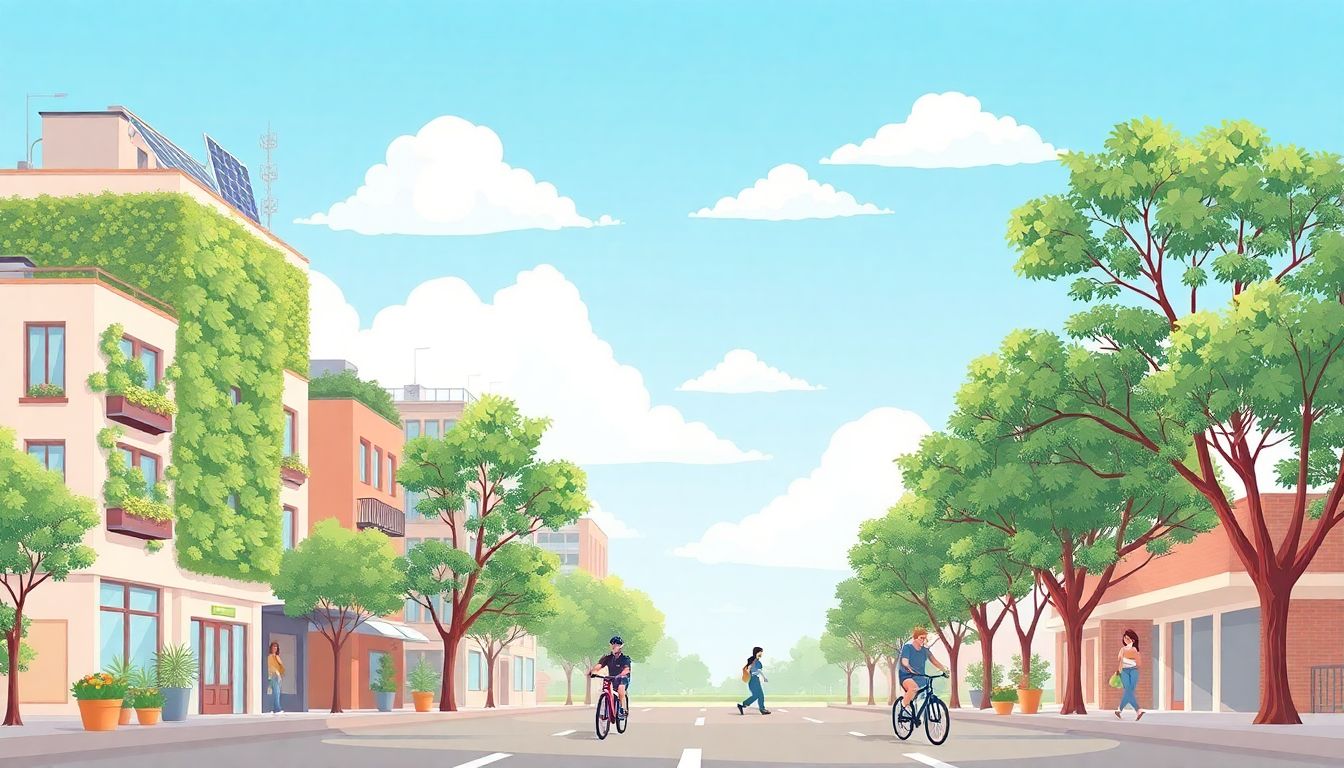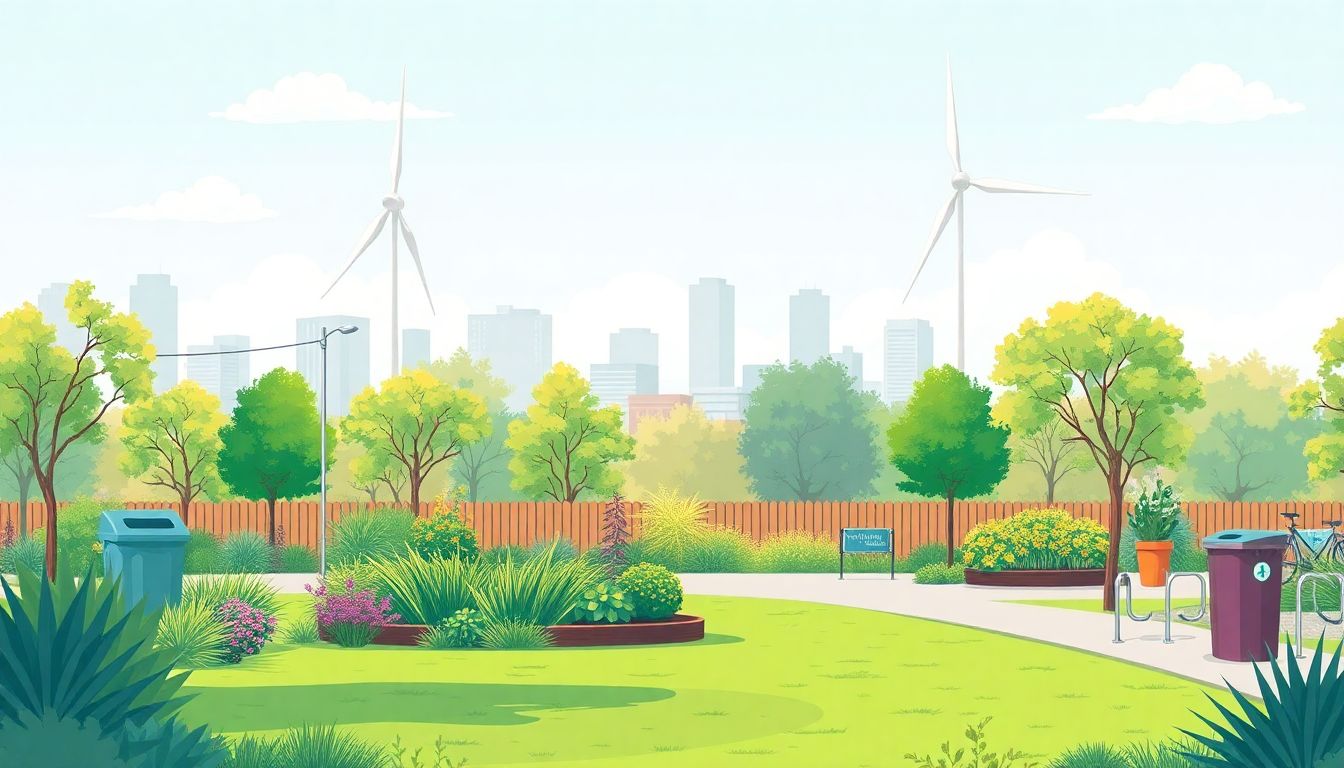As cities grow, it’s natural to feel a bit overwhelmed by urban sustainability challenges. Whether it’s traffic congestion, waste management, or energy use, it can seem like a daunting task to make our urban spaces greener and more livable. You’re definitely not alone in thinking this!
But here’s the good news: if you stick around, you’ll discover some amazing prompts that can spark ideas for urban sustainability projects using ChatGPT. These can help turn those overwhelming thoughts into manageable, actionable plans that lead to real changes in your community.
From innovative waste reduction strategies to encouraging renewable energy, we’ll explore a range of creative solutions. So let’s dive in and see how we can transform our cities into more sustainable places, one prompt at a time!
Key Takeaways
- Urban sustainability projects tackle issues like traffic, waste, and energy use in growing cities.
- Use ChatGPT prompts to brainstorm innovative urban sustainability ideas and solutions.
- Engage the community by organizing workshops and surveys to gather feedback on sustainability initiatives.
- Assess environmental impacts with structured prompts for urban development projects.
- Explore waste reduction strategies and public transportation improvements to enhance sustainability.
- Incorporate green infrastructure and sustainable design principles in urban planning for better livability.

Best ChatGPT Prompts for Urban Sustainability Projects
If you’re looking to use ChatGPT for urban sustainability projects, you’re in the right place. Here are some prompts that can help you generate innovative ideas and solutions:
- “Suggest five innovative urban sustainability projects that can be implemented in mid-sized cities.”
- “List ten ways to use AI technology to improve urban sustainability initiatives.”
- “Generate a detailed action plan for an urban green space initiative using sustainable practices.”
- “What are some challenges cities face in implementing sustainability projects, and how can AI address them?”
- “Create a checklist of sustainability metrics that urban planners should consider when starting a new project.”
These prompts can help stimulate discussions about how to enhance sustainability within urban environments using AI-driven solutions.
Ideas for Sustainable Urban Development Initiatives
Sustainable urban development focuses on enhancing the quality of life while minimizing the environmental impact. Here are some ideas that can spark your imagination:
- Transforming vacant lots into community gardens to promote local food production and green spaces.
- Introducing smart waste management systems that optimize collection routes based on real-time data.
- Developing mixed-use buildings that integrate residential, commercial, and recreational facilities to reduce travel needs.
- Implementing green roofs and solar panels in urban infrastructure to maximize energy efficiency.
- Creating pedestrian-friendly zones that prioritize walking and cycling over automobile traffic.
Each of these initiatives can lead to more resilient cities and improve the well-being of the community.
Engaging Community in Urban Sustainability Efforts
Community engagement is vital for successful urban sustainability projects. Involve local residents by using these strategies:
- “How can I organize a community workshop to gather input on sustainability initiatives in my neighborhood?”
- “What activities can promote public involvement in local sustainability efforts?”
- “Create a survey to assess residents’ priorities regarding urban green spaces.”
- “List ways to effectively communicate sustainability goals to diverse community groups.”
- “Identify local leaders who can help mobilize support for sustainability initiatives.”
By actively involving the community, you can ensure that your sustainability projects resonate with the people they aim to benefit.
Assessing Environmental Impact with ChatGPT Prompts
Understanding the environmental impact of urban projects is essential. Use these prompts to leverage ChatGPT’s capabilities:
- “Outline the key components of an environmental impact assessment for a new urban development project.”
- “What are some metrics to evaluate the sustainability of urban initiatives?”
- “Generate a report template for assessing the ecological impact of a public transportation project.”
- “Provide examples of successful environmental impact assessments in urban settings.”
- “How can AI tools streamline the process of assessing sustainability impacts for new projects?”
Using AI for environmental assessments can help urban planners make informed decisions that align with sustainability goals.

Innovative Solutions for Reducing Urban Waste
Reducing urban waste is crucial for creating sustainable cities. Here are some ChatGPT prompts to explore innovative waste reduction strategies:
- “List ten creative solutions for minimizing waste in urban environments.”
- “Describe a community-based recycling program that effectively engages local residents.”
- “Generate ideas for implementing a zero waste initiative in a mid-sized city.”
- “What are some successful examples of circular economy practices in urban settings?”
- “Create a step-by-step plan for launching a composting program for city dwellers.”
Using these prompts can help you brainstorm actionable strategies to tackle waste issues and promote sustainability in urban areas.
Prompts for Enhancing Public Transportation Sustainability
Public transportation is a key component of urban sustainability. Here are some prompts to enhance its sustainability:
- “Generate a list of eco-friendly public transit solutions for cities looking to reduce their carbon footprint.”
- “What initiatives can be taken to promote cycling and walking as alternatives to public transport in urban areas?”
- “Create a proposal for integrating electric buses into the city’s public transport system.”
- “Suggest potential partnerships between local governments and private companies to fund sustainable transit initiatives.”
- “Outline a marketing strategy to encourage the use of public transport among commuters.”
Utilizing these prompts will assist in developing comprehensive strategies to improve the sustainability of public transportation systems.
Using ChatGPT to Create Sustainable Urban Design Concepts
Sustainable urban design is essential for creating livable cities. Leverage ChatGPT with these design-focused prompts:
- “Generate a list of sustainable architecture concepts that could be applied in urban environments.”
- “What are the key principles of designing smart cities using AI technology?”
- “Outline a project plan for creating green public spaces using rainfall harvesting techniques.”
- “Describe how integrating nature into urban design can improve both aesthetics and functionality.”
- “Create a checklist for evaluating the sustainability of new urban design proposals.”
These prompts can help you innovate and create designs that not only look good but also support environmental goals.
Prompts for Green Infrastructure Planning in Cities
Green infrastructure is crucial for urban resilience. Use these prompts to explore potential projects:
- “List ten examples of green infrastructure that can be implemented in urban areas.”
- “What are the benefits of incorporating green roofs in urban development?”
- “Generate a detailed plan for creating an urban park that incorporates native plant species.”
- “Describe the process for obtaining community input on green space planning.”
- “How can cities utilize rain gardens to manage stormwater effectively?”
Applying these prompts will enable you to design and plan green infrastructure that enhances urban ecosystems and community well-being.

Encouraging Renewable Energy Adoption in Urban Areas
Encouraging renewable energy adoption in urban areas is essential for reducing carbon footprints and promoting sustainable living.
To get started, consider these prompts to inspire actionable strategies:
- “List five ways cities can incentivize homeowners to install solar panels.”
- “Describe a successful initiative for promoting wind energy in urban settings.”
- “Generate a proposal for launching a community solar program that benefits low-income residents.”
- “What are the key barriers to renewable energy adoption in cities, and how can they be overcome?”
- “Identify local stakeholders who could be engaged to promote renewable energy initiatives.”
Utilizing these prompts can help foster a culture of renewable energy adoption, engaging communities and driving environmental change.
Facilitating Partnerships for Urban Sustainability Projects
Building partnerships for urban sustainability projects enhances collaboration and resource sharing.
Here are some prompts to help facilitate these partnerships:
- “Outline a strategy for engaging local businesses in sustainability initiatives within the community.”
- “Suggest ways to integrate social organizations into urban sustainability projects.”
- “Create a partnership agreement template that outlines roles and responsibilities for stakeholders.”
- “List potential funding sources for collaborative urban sustainability projects.”
- “Describe how to leverage public-private partnerships to enhance urban sustainability outcomes.”
These prompts can assist you in forming effective partnerships that drive urban sustainability efforts forward.
FAQs
Engaging the community can be achieved through workshops, surveys, and public forums. Collaborate with local organizations and utilize social media to raise awareness and invite participation in sustainability initiatives.
ChatGPT can analyze project proposals by generating potential impact scenarios, suggesting metrics for evaluation, and highlighting sustainability risks. It can also draft reports based on gathered data to facilitate informed decision-making.
Implement composting programs, encourage recycling initiatives, and develop waste-to-energy projects. Promote community buy-back schemes for recyclables and support upcycling workshops to foster innovation in waste reduction.
Facilitate partnerships by bringing together local governments, NGOs, businesses, and residents through networking events. Establish common goals and provide platforms for collaboration, ensuring that all voices and resources are acknowledged.
